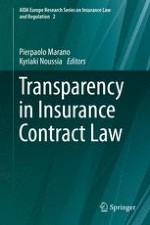2019 | OriginalPaper | Chapter
Transparency in the Insurance Contract Law of Peru
Author : Alonso Núñez del Prado Simons
Published in: Transparency in Insurance Contract Law
Publisher: Springer International Publishing
Activate our intelligent search to find suitable subject content or patents.
Select sections of text to find matching patents with Artificial Intelligence. powered by
Select sections of text to find additional relevant content using AI-assisted search. powered by
